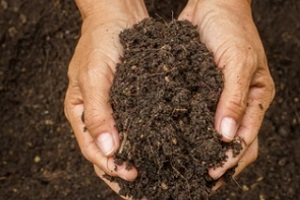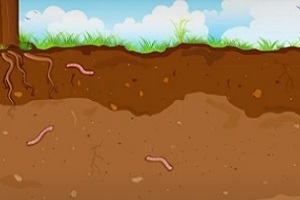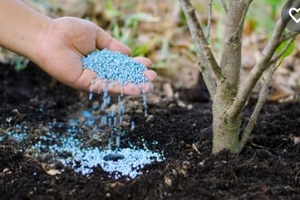 Many people think of soil as simply being dirt that is used for planting, but it is actually a complex living ecosystem that is made up of living organisms linked together through energy flows and nutrient cycles. Soil contains billions of microorganisms – including insects, fungi, bacteria, earthworms and nematodes – that all work together to carry out import functions.
Many people think of soil as simply being dirt that is used for planting, but it is actually a complex living ecosystem that is made up of living organisms linked together through energy flows and nutrient cycles. Soil contains billions of microorganisms – including insects, fungi, bacteria, earthworms and nematodes – that all work together to carry out import functions.
Understanding how these microorganisms work together to keep soil healthy can improve your gardening efforts. Here’s a brief look at the role each of these components plays:
- Insects chew organic material down into smaller pieces, which bacteria and fungi can then access easily for sustenance.
- Fungi and bacteria break down dead animal and plant tissue to serve as nutrients for plants.
- Earthworms burrow and build pathways inside the soil that fill with water and air for the plant’s roots.
- Nematodes eat soil organisms and plant material and then release plant nutrients through their waste.
With this in mind, it is easier to understand how you can keep your soil healthy. Soil health refers to the soil’s ability to sustain agricultural productivity while protecting environmental resources. Healthy soil supports plant growth through the regulation of air and water supply, cycling nutrients, and controlling plant pests biologically.
How To Keep The Soil In Your Garden Healthy
There is a complex interplay of chemical, biological and physical processes that work to keep soil in optimum condition. Thankfully, sound soil management practices can go a long way toward ensuring that your soil is as healthy as possible.
The key to a healthy soil ecosystem is providing your plants with easy access to the nutrients, water and air they need. Here are some tips for keeping your soil healthy.
Test Your Soil
The first step to understanding where your soil’s strengths and weaknesses exist is having it tested. Many universities and garden centers offer soil testing services that can provide valuable information about your soil’s nutrients, organic matter, pH and texture. These results can also point to the right fertilizers to help your plants grow.
Pay Attention To Organic Matter Levels
 Organic matter is the best way to improve the physical properties of your soil, such as the availability of water and air to ensure optimal root growth. Organic matter is made up of living plant roots and organisms, enzymes that are secreted by soil organisms that bind soil particles together, and decomposing animal and plant residues.
Organic matter is the best way to improve the physical properties of your soil, such as the availability of water and air to ensure optimal root growth. Organic matter is made up of living plant roots and organisms, enzymes that are secreted by soil organisms that bind soil particles together, and decomposing animal and plant residues.
As soil organisms like bacteria and fungi break down animal and plant parts, nutrients are made available to the plants, who then feed soil organisms with their remains. Maintain your soil’s organic matter levels by introducing organic matter to make up for what it has lost because of decomposition.
Healthy crops are an important source of organic matter, and you can return crop residue to the soil to help keep it healthy. Compost, manure, perennial crops and cover crops can also help to increase the soil’s organic matter. It is important to monitor your soil’s organic matter content on a regular basis.
Rotate Crops
Rotating crops is a great way to break up disease and soilborne pest life cycles. It can also help you to manage weeds naturally. Rotating crops means the pests that thrive in one crop will not have enough time to build up their population before a different crop is planted.
This is also a good way to prevent nutrient depletion. Keep in mind that plants that have long roots, such as carrots, will absorb nutrients deeper in soil, while those with shallow roots, like onions, absorb nutrients from the top few inches of soil.
Certain crops can introduce nutrients back into the soil. For example, when legumes such as peas and beans die, their nitrogen will become available to the next plants in the rotation. Crop rotation is typically carried out based on plant families, and it is easy to research these online to ensure you get the most out of your efforts.
Provide Your Soil With Air And Water
The roots of your plants and microbes in the soil need access to water and air for optimal growth. Although soil contains many microenvironments with different amounts of water, air and nutrients, it is important to keep in mind that soil compaction and disturbances like tillage can compromise these microenvironments, making it more difficult for the roots of your plants to penetrate the soil and absorb the nutrients and water they need. Moreover, disturbing soil can expose weed seeds to light and increase their germination, which means you could end up with a proliferation of weeds.
To avoid this, consider using hand tools to prepare your garden beds rather than tillers. Avoid soil compaction around the roots of your plants by using designated walking paths through your planting beds or planting in raised beds. If you have compacted soil, you can incorporate compost into it to provide more nutrients, water and air that your plants can reach. For trees and shrubs, use 4 inches of compost incorporated 12 inches deep, while flowers and vegetables need 1 to 2 inches of compost incorporated 6 to 8 inches deep.
Reduce Your Use Of Chemicals
 Although pesticides can be very effective at killing pests, it is important to keep in mind that they also kill beneficial microbes and insects in the soil. If you are planting crops for consumption, pesticides could also negatively impact your health. Therefore, it is best to use alternatives or plant disease-resistant varieties of plants that grow well in your area. Physical barriers can also be used to keep bigger critters away from your crops.
Although pesticides can be very effective at killing pests, it is important to keep in mind that they also kill beneficial microbes and insects in the soil. If you are planting crops for consumption, pesticides could also negatively impact your health. Therefore, it is best to use alternatives or plant disease-resistant varieties of plants that grow well in your area. Physical barriers can also be used to keep bigger critters away from your crops.
Cover The Soil
Topsoil is rich in microorganisms, soil nutrients and organic matter, but it is highly vulnerable to erosion from rain and the elements. When a raindrop lands on bare soil, it could splash soil particles a few feet up into the air. Consider mulching bare soil around your plants to keep the soil in place, and plant cover crops to conserve soil moisture and reduce weeds.
Reach Out To Dirt Connections
Get in touch with Dirt Connections for all of your soil-related needs and questions. We offer a range of soil services, as well as fill dirt and bio mix soils, to customers across Virginia and Maryland.
Summary

Dirt Connections was started with one goal in mind: providing quality residential and commercial construction services to clients on time and on budget. Reach out for more information on how we can support your next project.
For your convenience our estimates are free and by appointment. Call 703-940-9949 for a free estimate today!









































